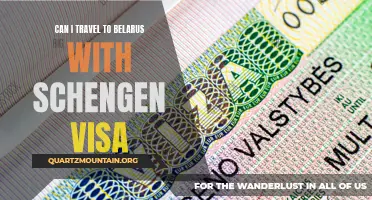
In an increasingly globalized world, the demand for international medical tourism is on the rise. Patients from different countries are traveling abroad to seek affordable and high-quality medical treatments. To regulate and facilitate this growing industry, some countries have started implementing a Health Travel Visa. This innovative concept brings numerous benefits to patients, healthcare providers, and the economies of both the host and home countries. In this article, we will explore the advantages of a Health Travel Visa for international medical tourism and how it is revolutionizing the healthcare landscape.
What You'll Learn

Definition and Purpose of a Health Travel Visa
When planning to travel abroad for medical treatment or procedures, it is essential to understand the requirements and processes involved. One crucial aspect to consider is the health travel visa, also known as a medical visa. This specialized visa is designed for individuals traveling specifically for medical purposes.
A health travel visa allows individuals to enter a foreign country for medical treatment or to undergo a medical procedure. It is different from a regular tourist visa or business visa, as it is tailored to accommodate the unique needs of patients seeking medical care abroad. Countries with well-established medical tourism sectors often offer health travel visas to attract international patients.
The main purpose of a health travel visa is to ensure that patients traveling to a foreign country for medical reasons have the necessary clearance and legal documentation. It also helps the destination country keep track of individuals seeking medical treatment and ensures that they comply with local laws and regulations.
To obtain a health travel visa, patients must typically provide specific documentation, including medical records, treatment plans, and a letter from a recognized medical institution or doctor confirming the need for treatment abroad. In some cases, patients may also need to provide proof of sufficient funds to cover the cost of treatment and accommodation.
The application process for a health travel visa may differ from one country to another, but it usually involves submitting an application form and supporting documents to the embassy or consulate of the destination country. It is crucial to start the process well in advance to allow for any delays or additional requirements that may arise.
The validity and duration of a health travel visa can vary depending on the destination country and the proposed treatment. Some countries offer single-entry visas, which allow patients to enter the country once for a specific treatment, while others may provide multiple-entry visas for extended treatment plans or follow-up appointments. It is essential to check the visa requirements of the destination country to ensure compliance.
It is worth noting that a health travel visa does not guarantee the success of the medical treatment or procedure. Patients must still undergo the necessary medical evaluations and consultations to determine the suitability and effectiveness of the proposed treatment. Additionally, patients should consider factors such as language barriers, cultural differences, and the availability of follow-up care when choosing to travel for medical treatment.
In conclusion, a health travel visa is a specialized visa designed for individuals seeking medical treatment or procedures abroad. Its primary purpose is to provide a legal framework for patients traveling internationally for medical reasons and ensure compliance with local laws and regulations. Obtaining a health travel visa requires careful preparation and adherence to the specific requirements of the destination country.
How to Travel to the Bahamas with a US Visa: Everything You Need to Know
You may want to see also

Eligibility and Requirements for Obtaining a Health Travel Visa
If you are planning to travel abroad for medical treatment, you may need to obtain a health travel visa in order to enter and receive healthcare services in the foreign country. A health travel visa is a special type of visa designed specifically for individuals seeking medical treatment abroad. This visa allows the traveler to visit the destination country for the purpose of receiving medical care, and it is different from a regular tourist or business visa.
To be eligible for a health travel visa, you will typically need to meet certain requirements and provide specific documents. While the exact requirements may vary depending on the country and embassy, here are some common eligibility criteria and requirements for obtaining a health travel visa:
- Medical Letter/Certificate: You will usually need to provide a letter or certificate from your healthcare provider or medical facility confirming the need for medical treatment abroad. This letter should outline the details of your medical condition, the recommended treatment, and the estimated duration of your stay.
- Treatment Certificate/Quote: You may be required to provide a treatment certificate or quote from the medical facility abroad. This document should include the treatment plan, estimated costs, and any other relevant details about the medical services you are seeking.
- Travel Itinerary: It is important to provide a detailed travel itinerary, including your arrival and departure dates, the purpose of your visit, and any other plans you have during your stay. This will help the embassy assess the duration and purpose of your trip.
- Travel Insurance: Many countries require travelers to have travel insurance that covers medical expenses. It is essential to obtain comprehensive travel insurance that includes coverage for medical treatment abroad. You will need to provide proof of this insurance when applying for a health travel visa.
- Financial Proof: You may have to demonstrate that you have sufficient funds to cover your medical expenses, travel costs, and accommodation during your stay. This can be done by providing bank statements, proof of employment, or any other evidence of financial stability.
- Passport and Photograph: As with any visa application, you will need a valid passport and recent passport-sized photographs. Make sure your passport is valid for at least six months beyond your intended departure date.
- Visa Application Form: Complete the visa application form accurately and truthfully. Pay attention to all the required fields and provide the necessary information. Be prepared to answer questions about your medical condition and the purpose of your trip.
It is vital to apply for a health travel visa well in advance of your intended travel date. Processing times may vary, and it is important to allow enough time for any additional requirements or requests from the embassy.
Remember to check the specific guidelines and requirements of the country you plan to visit, as these can vary considerably. Some countries may have additional requirements, such as medical tests or specific certification from recognized medical institutions.
Obtaining a health travel visa can be a complex process, so it is advisable to seek assistance from a professional visa service or consult with the embassy or consulate of the destination country. They will be able to provide the most up-to-date information and guidance to help you navigate the application process and ensure a smooth journey for your medical treatment abroad.
Understanding the Australian Travel Visa: What You Need to Know
You may want to see also

Benefits and Limitations of a Health Travel Visa
If you are planning to travel abroad for medical treatment, you may need to obtain a health travel visa. A health travel visa is a special type of visa that allows individuals to seek medical care in a foreign country. It is important to understand the benefits and limitations of a health travel visa before embarking on your medical travel journey.
Benefits of a Health Travel Visa:
- Access to specialized medical care: One of the primary benefits of a health travel visa is the ability to access specialized medical care that may not be available in your home country. This can be particularly beneficial for individuals seeking treatment for complex medical conditions or rare diseases.
- Cost savings: In many cases, seeking medical treatment abroad can offer significant cost savings compared to receiving the same treatment in your home country. This is particularly true for countries with lower healthcare costs or those that offer government subsidies for medical tourists.
- Reduced waiting times: Another advantage of a health travel visa is the ability to bypass long waiting times for medical treatment. Many countries that attract medical tourists have well-established healthcare systems that prioritize timely access to medical care for international patients.
- High-quality facilities and technology: Countries that welcome medical tourists often boast state-of-the-art medical facilities and cutting-edge technology. This means that you can benefit from the latest advancements in medical science and technology while receiving treatment.
Limitations of a Health Travel Visa:
- Language and cultural barriers: Traveling to a foreign country for medical treatment can present challenges due to language and cultural barriers. It is essential to ensure that you have access to translators or interpreters who can help you communicate with healthcare providers and understand the medical procedures and instructions.
- Legal and regulatory considerations: Each country has its own set of legal and regulatory requirements for medical tourism. It is crucial to familiarize yourself with these regulations to understand what is expected of you as a medical tourist and to avoid any legal complications.
- Follow-up care: After receiving medical treatment abroad, you may require follow-up care or rehabilitation. It can be challenging to coordinate this care if you are back in your home country. It is important to plan ahead and discuss with your healthcare provider how to manage follow-up care effectively.
- Insurance coverage: Health travel visas do not guarantee insurance coverage for your medical treatment abroad. It is essential to review your health insurance policy to determine if it covers medical treatment overseas or if you need to purchase additional travel or medical insurance for this purpose.
A health travel visa offers numerous benefits for individuals seeking medical treatment abroad, including access to specialized care, cost savings, reduced waiting times, and state-of-the-art medical facilities. However, there are also limitations to consider, such as language and cultural barriers, legal and regulatory considerations, follow-up care, and insurance coverage. It is important to weigh these factors carefully and make informed decisions when pursuing medical treatment abroad.
Can You Travel to Croatia with a Schengen Visa?
You may want to see also

Tips for Applying and Using a Health Travel Visa
As travel restrictions ease and more countries reopen their borders, many people are starting to plan their international trips again. However, with the ongoing COVID-19 pandemic, several countries require travelers to obtain a health travel visa before entering their territory. This visa ensures that travelers meet certain health criteria and are not carrying the virus.
If you are planning to travel internationally and need to apply for a health travel visa, here are some important tips to consider:
- Research and understand the requirements: Before applying for a health travel visa, make sure to research and understand the specific requirements of the country you plan to visit. Each country may have different guidelines and criteria for issuing the visa. Visit the official government website or contact their embassy or consulate to gather detailed information about the visa application process.
- Allow enough time for processing: Applying for a health travel visa may take time, so it is important to start the application process well in advance. There might be a waiting period for approval, and scheduling an appointment for the required medical tests or health screenings can also take time. Plan your travel dates accordingly, allowing for sufficient processing time.
- Gather all necessary documents: The visa application process usually requires submitting several documents to prove your eligibility and health status. Commonly required documents include a valid passport, a completed visa application form, a recent passport-sized photograph, proof of travel medical insurance, and a negative COVID-19 test result. Make sure to gather all the required documents and keep them organized for easier submission.
- Get a COVID-19 test: Many countries require travelers to provide a negative COVID-19 test result taken within a certain timeframe before their arrival. Research and find out which type of test is accepted by the destination country and make an appointment to get tested accordingly. Allow enough time for the test results to be processed and ensure they are within the required timeframe.
- Follow the application instructions carefully: When filling out the visa application form, be sure to read and follow the instructions carefully. Any mistakes or missing information can delay the processing of your application or even result in a visa denial. Double-check all the information you provide and ensure its accuracy. If you are unsure about any part of the application, seek assistance from the embassy or consulate.
- Stay updated with travel advisories: Travel advisories and guidelines may change frequently, especially during the current global health crisis. Stay updated with the latest information provided by health authorities, the embassy, or the consulate of the country you plan to visit. This will help you stay informed about any new requirements or restrictions that may affect your travel plans.
- Comply with health protocols: Once you have obtained your health travel visa and arrived at your destination, it is essential to comply with all the health protocols and restrictions set by the local authorities. This may include wearing masks, practicing social distancing, and following quarantine guidelines. Failure to comply with these measures may result in penalties or denied entry.
Traveling during these uncertain times requires careful planning and adherence to health and safety protocols. By following these tips, you can ensure a smoother process when applying for and using a health travel visa. Remember to prioritize your health and the well-being of others while enjoying your international travel experience.
Essential Tips for Charging Boots of the Traveler with Vis
You may want to see also
Frequently asked questions
A health travel visa is a document that allows individuals to travel to a specific country for medical purposes or treatment.
To obtain a health travel visa, you typically need to apply through the embassy or consulate of the country you plan to visit. This process may involve providing medical documentation, proof of treatment or consultation, and other required information.
A health travel visa is necessary to ensure that individuals seeking medical treatment abroad have the appropriate permission to enter a foreign country and access healthcare services. It helps authorities monitor and facilitate medical tourism while maintaining standards of healthcare and patient safety.







